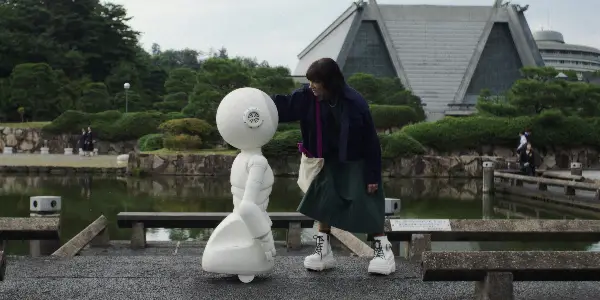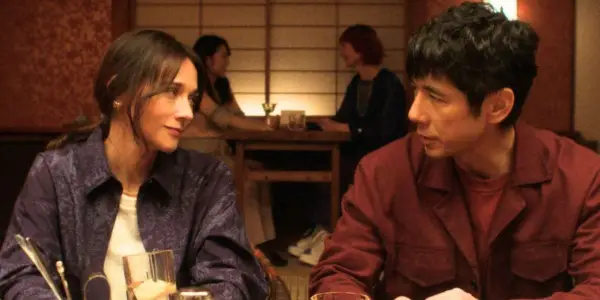SUNNY: Apple’s Promising Kyoto-Set Dark Comedy Brings Mixed Feelings

Tynan loves nagging all his friends to watch classic movies…
I normally watch movies by trade. TV is a longer commitment so when I’m planning to kick my feet up, I like something fun and breezy like a rerun of Parks and Recreation.
Sunny isn’t what I would usually sign up for when it comes to serialized content. It’s a dark, uncanny thriller adapted by writer Katie Robbins and director Lucy Tcherniak from a novel by Irishman Colin O’Sullivan. The growing sense of tension and general unease running through the show frazzles the nerves. And yet I was intent on searching it out.
When looking at the marketing materials for Sunny, one immediately notices how the title is featured in English and then katakana (the syllabic characters used to represent Japanese loan words). It seems like it might be an aesthetic choice that looks sleek in promotion. However, after watching the opening minutes of the show’s first episode, I had a slightly different reaction.
Every name that came on screen, regardless of country of origin, was noted in English and Japanese. It’s signaling to us that this production is international, further staking its claim on an emerging, globalized audience. Everything Everywhere All At Once did something similar.
Stranger in a Strange Land
Sunny exists in a space I’m not sure we have seen often in television. This shouldn’t be too much of a surprise as streaming becomes the new frontier and unique forms of entertainment continue to break down barriers between, not only TV and movies but also insular international markets.
By utilizing its setting in a near future Japan, it finds this perfect Venn diagram between the contemporary moment and the fringes of where we’re going in our hyper-technological world. At the same time, it does its best to accentuate a retro vibe. In particular, there are the classically conceived animated title credits and a soundtrack filled with Showa-era pop tunes playing in eerie counterpoint to the storyline.
Our heroine (Rashida Jones) is grieving the loss of her husband and son as a stranger in a strange land. In the wake of these tragic events, she must navigate her fraught relationship with her mother-in-law (Judy Ongg) before inexplicably making friends with the English-speaking “Mixxie,” (Annie the Clumsy) who lends an ear when Suzie drowns her sorrows at a local bar.
After a Homebot named “Sunny” (voiced by Joanna Sotomura) gets brought to Suzie’s doorstep by an affable stranger (Jun Kunimura), as a gift from her late husband, a whole convoluted world of conspiracy opens up before her.
Beyond requisite genre thrills, Sunny promises to be a show as much about societal questions on loneliness and ethics as it is about humanity’s relationship with technology itself. Japan seems especially suited to this given its complicated and well-documented relationship with technology and a massive epidemic of loneliness.

In its very conception, it feels like an incubator to bring people together across language barriers and cultures. But against such a world Sunny’s darkly comic too. One wonders if the humor is mostly confined to a Western audience. Jones has proved she can be dour, but here she turns the acerbicness up a notch or two, which feels especially prickly in a Japanese culture averse to sarcasm and abrasiveness in general.
She says everything some expatriates have wanted to say sitting in line at the ultra-efficient if slightly persnickety government offices. Though even with personal in-ear translators it remains to be seen if nuance, intention, and humor are still transferable across cultures. Because even if we understand the literal meaning of words, it doesn’t necessarily mitigate all cultural breakdowns. These are the perils and pitfalls of living in intercultural spaces, whether in real life or vicariously through media.
My mind goes to Hirokazu Kore-eda’s 2019 project The Truth. It stars Catherine Deneuve, Juliette Binoche, and Ethan Hawke – three of my favorite actors – in a film directed by one of my favorite directors working today.
It’s an example of all these people I love who came together to make an enjoyable if mostly slight movie. I want to love it and celebrate the universal language of storytelling, but it feels more diluted than their work in their native industries.
I never thought I would see Rashida Jones and Hidetoshi Nishijima (Drive My Car), in a project together, but here they are. Coincidentally, Evil Does Not Exist, directed by Drive My Car’s Ryusuke Hamaguchi, did remind me nominally of an arthouse Parks and Rec episode, but that’s hardly material here.
Since collaborations like this have a lot of promise in the future, I’m genuinely curious if globalization will continue to take us to a place of greater and more fluid international production where no single force outweighs the other.
For all the stellar talent from Japan and the local milieu around Kyoto, Sunny is ultimately American-made with an A24 pedigree. This is what ultimately wins out. Like Apple’s Ted Lasso, it might be set abroad, but it has an American sentiment through and through thanks to the protagonist. And that’s perfectly fine.
Observations and Qualms
Watching Sunny as someone who lived in Japan, there are moments of gleeful recognition. Suzie has her meet-cute with her future husband at a vending machine ramen shop. Anyone who’s struggled to order knows the shame of the line forming behind you quietly or the compartmentalized cubbies for parties of one which feel like quintessential Japanese in protecting anonymity. Or to evoke the ubiquitous Christmas season (a la Shane Black) there’s mention of the Kentucky Christmas Bucket. KFC in Japan is no joke during the holidays.
Like Wes Anderson’s Isle of Dogs, at times it does feel like a Westerner with deep admiration for Japanese culture has stuck all the things they know about Japan into the narrative. Jones’s character talks about how she read an article about hermits in Japan who disengage from society or “Hikikomori.” It sounded perfect to her and so she caught a plane over. Although there are many Japanese members of the production, it does feel like the mentality exhibited by Suzie also colors the making of the show.
To this point, I’m curious if there was any concrete reason for the narrative to be shot in Kyoto other than it being based on a novel and Kyoto evoking a traditional Japan. In fairness, the near-future gives license for some latitude – this is not literal Japan – but the show does still feel like a simulacrum of Japanese culture at times.
Perhaps this too is unkind because there is something gentle about their chemistry, but I also wanted more reason to be invested in Suzie and Masa’s story as a couple. It feels like after a few episodes, we get less and less of them as Masa exists mostly in the dreams and memories of his spouse – more as an enigma and a plot point than anything else.

One other problem is not necessarily unique to Sunny. Like later installments of Ted Lasso, some of the episodes feel a little self-indulgent because there aren’t the forced guardrails of commercial breaks and more conventional television structure. This more circuitous form may be the future of programming where audiences always seem to choose more content and not less. As a creative, I understand not wanting to be constrained, but sometimes limitations are beneficial; they help us tell focused stories.
Because, for all the intriguing themes laid before us in Sunny, sometimes it’s easy to question where the show spends its time and resources. It’s worthwhile to note that the spine of the show focuses on the relationships between women which is refreshing to see. Annie the Clumsy is an affable supporting lead though she seems little more than a foil for Suzie since Mixxie conveniently speaks English. Suzie needs someone to talk to so she can process her loss (and also provide exposition to the audience).
Likewise, Suzie’s relationship with her mother-in-law is another point of conflict, and the main villain in this world of intrigue and conspiracy is a delightfully menacing yakuza played with creepy verve by the Japanese actress You. There’s no reason to hide her vocation because if a story’s set in Japan, it’s bound to bring up the country’s notorious criminal syndicates at some point.
While the premise is rich with promise and the performances across the board feel commendable from the top down, the show doesn’t seem to say much about the issues at its core. The hope seems to be that the conventional beats of a thriller along with the pervasive unease will keep the audience engaged.
It basically works, but I wish the characters were ones we could get more attached to. Rashida Jones shows an impressive display of bitterly despondent vitriol, but the relationships she forms and the moments she finds herself in are not always satisfying.
Conclusion: Sunny
Our globalized world is becoming increasingly complex and Sunny has such a striking, even unprecedented, opportunity to tackle this growing reality. It gets part of the way there before reverting to genre mechanisms that feel mostly standard issue.
If Sunny does come back for another season, leaning into these core relationships will be what makes the show hit a groove, especially if it can continue to explore the pluralistic world we live in of growing technology, internationalization, and continual code-switching.
In flashback Masa confesses to his future wife that when people used to look at him, it hurt; now he likes when people look at him and he likes looking at people…
It was one of the most meaningful interactions in the entire show because it feels like in a story with so many secrets and a country with so much isolation, there is something powerful about being known and loved by other human beings, like a light shining in the darkness.
Sunny premiered on Apple+ on Wednesday, July 10, 2024. New episodes are released every Wednesday through September 4.
Does content like this matter to you?
Become a Member and support film journalism. Unlock access to all of Film Inquiry`s great articles. Join a community of like-minded readers who are passionate about cinema - get access to our private members Network, give back to independent filmmakers, and more.
Tynan loves nagging all his friends to watch classic movies with him. Follow his frequent musings at Film Inquiry and on his blog 4 Star Films. Soli Deo Gloria.













